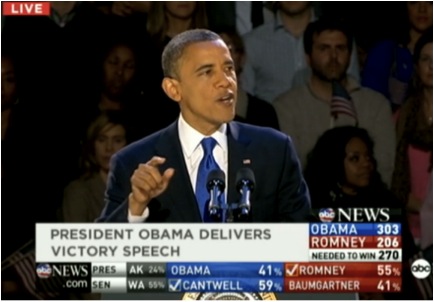Yes We Can: The campaign/proposal writing
You have to get lots of people involved. In fact, the more people who share your vision, the better. You tell the voters/donors what they want to hear. Persuasion and hyperbole can be more important than substance. The popular vote/buy-in of the people served may be irrelevant in the end. You’re happy (though thoroughly exhausted) when the campaign is over/proposal is submitted, but the hard work is yet to come.
Yes We Are: Governing/project implementation
What you face now is inevitably more complicated than what you portrayed in the campaign/proposal. With everyone wanting something from you, there are many competing priorities and it’s not always clear which is the best decision. Are there ever enough resources? Despite the election promises/logframe, the arcane and dysfunctional aspects of the system(s) in which we operate often get in our way.
Yes We Did: Seeking reelection/report writing
Despite what you did or did not accomplish, ultimately people’s perceptions will determine if you are considered successful or not. You highlight what you accomplished and ensure there’s a good explanation for what you didn’t. After four years, you may have a better idea of what you’re doing, but a rapidly changing reality means no election/project can ever be the same.
Most importantly, if you don’t inspire people to believe that a brighter future is possible for everyone, you might as well go home.
Forward!
***
Related Posts
Community Resilience: An Untapped Resource for Sustainable Development?


This is a neat comparison because it involves the potential recipient in important choices only they can really make, being on the ground. With the growth of crowdsourcing online and with cellphones, most people in a community could respond to questions about project ideas, how to implement them, and most importantly, did it work and why not.
The only impediment will probably come from the agencies themselves, citing such novel concepts and processes as too complex and/or disruptive of current procedures; as a euphemism to conceal other vested interests. Let’s see.
What? no third party evaluations?
Oh my, how could I forget the growth of pundits/evaluators who have incredibly varied and often unsubstantiated levels of expertise, but who somehow always have something to say and someone who will listen?
Nice analogy, and very useful, but neglects the donor constraints. As a retired USAID Health Officer, I was responsible for developing the activities and RFAs RFPs that Howmatters.org seem to be referring to. So, an additional comparison could be the Party issue. Romney the Liberal Massachusetts Governor was very different than Romney the Severely Conservative Republican primary candidate or the Romney the moderate Republican nominee, as he had differing constituencies to please. (note, it didn’t work, did it?) A family planning project under a Mexico City Policy is very different than under a democratic administration.
Another issue is that if you try to collect “community input” for international development, the people who will speak the loudest and most, are those who have the strongest self interest (think tea party), but may not represent at all the majority or probably not the target population (poorest of the poor?). So, while it is important to collect as much information from and about the beneficiaries, one must utilize all modalities and be aware of the big picture.
We know there are vested interests in both donor agencies and recipient communities already, and not much is done to stop them. “Third party” evaluation is also limited. Rigorous assessment,evaluation and project adjustment components can be incorporated into community crowdsourced data gathering, sufficient to counter bias, and ensure majority input and consultation, virtually none of which occurs in mainstream development as it operates today.
Pingback: Digest 9th November 2012 « Global Health Interest Forum
Pingback: IB Online (2/11): Eine kleine Netzschau « Bretterblog
From Deborah Eade via LinkedIn: “I hope not much at all: zillions of dollars spent on negative and often mendacious advertising, deep carbon footprint as candidates fly around the country, attempts to sabotage early voting by the supporters of the other party, neanderthal views on women and labour rights by candidate who could have won – and did win huge popular support – no mention by anyone of climate change, and an adversarial winner-takes-all system that discourages mature dialogue, mutual respect and the capacity to reach a principled compromise.”